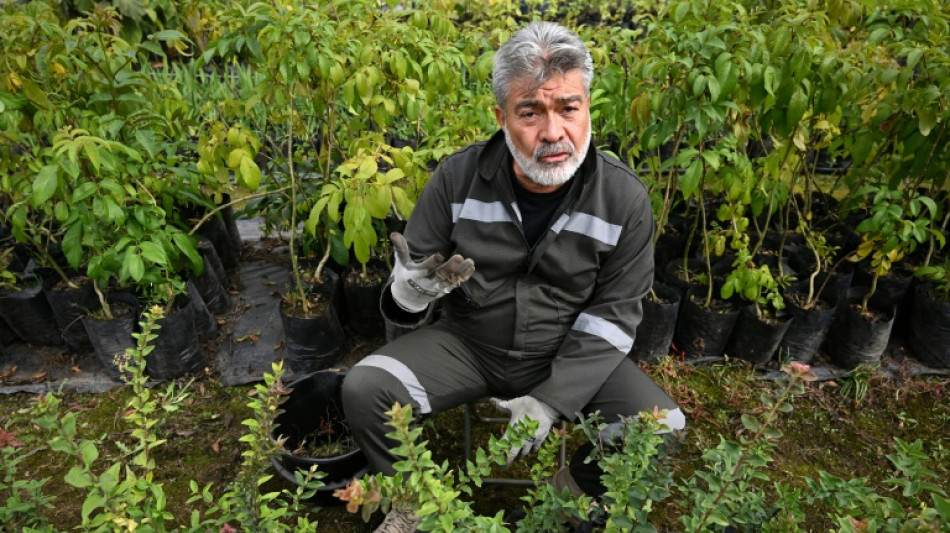
-
 Trump says Iran wants deal, US 'armada' larger than in Venezuela raid
Trump says Iran wants deal, US 'armada' larger than in Venezuela raid
-
US Justice Dept releases new batch of documents, images, videos from Epstein files

-
 Four memorable showdowns between Alcaraz and Djokovic
Four memorable showdowns between Alcaraz and Djokovic
-
Russian figure skating prodigy Valieva set for comeback -- but not at Olympics

-
 Barcelona midfielder Lopez agrees contract extension
Barcelona midfielder Lopez agrees contract extension
-
Djokovic says 'keep writing me off' after beating Sinner in late-nighter

-
 US Justice Dept releasing new batch of Epstein files
US Justice Dept releasing new batch of Epstein files
-
South Africa and Israel expel envoys in deepening feud

-
 French eyewear maker in spotlight after presidential showing
French eyewear maker in spotlight after presidential showing
-
Olympic dream 'not over', Vonn says after crash

-
 Brazil's Lula discharged after cataract surgery
Brazil's Lula discharged after cataract surgery
-
US Senate races to limit shutdown fallout as Trump-backed deal stalls

-
 'He probably would've survived': Iran targeting hospitals in crackdown
'He probably would've survived': Iran targeting hospitals in crackdown
-
Djokovic stuns Sinner to set up Australian Open final with Alcaraz

-
 Mateta omitted from Palace squad to face Forest
Mateta omitted from Palace squad to face Forest
-
Djokovic 'pushed to the limit' in stunning late-night Sinner upset

-
 Tunisia's famed blue-and-white village threatened after record rains
Tunisia's famed blue-and-white village threatened after record rains
-
Top EU official voices 'shock' at Minneapolis violence

-
 Kremlin says agreed to halt strikes on Kyiv until Sunday
Kremlin says agreed to halt strikes on Kyiv until Sunday
-
Carrick calls for calm after flying start to Man Utd reign

-
 Djokovic to meet Alcaraz in Melbourne final after five-set marathon
Djokovic to meet Alcaraz in Melbourne final after five-set marathon
-
Italian officials to testify in trial over deadly migrant shipwreck

-
 Iran says defence capabilities 'never' up for negotiation
Iran says defence capabilities 'never' up for negotiation
-
UN appeals for more support for flood-hit Mozambicans

-
 Lijnders urges Man City to pile pressure on Arsenal in title race
Lijnders urges Man City to pile pressure on Arsenal in title race
-
Fulham sign Man City winger Oscar Bobb

-
 Strasbourg's Argentine striker Panichelli sets sights on PSG, World Cup
Strasbourg's Argentine striker Panichelli sets sights on PSG, World Cup
-
Jesus 'made love': Colombian president irks Christians with steamy claim

-
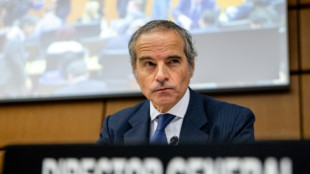 IAEA board meets over Ukraine nuclear safety concerns
IAEA board meets over Ukraine nuclear safety concerns
-
Eurozone growth beats 2025 forecasts despite Trump woes

-
 Dutch PM-elect Jetten says not yet time to talk to Putin
Dutch PM-elect Jetten says not yet time to talk to Putin
-
Social media fuels surge in UK men seeking testosterone jabs

-
 Forest face Fenerbahce, Celtic draw Stuttgart in Europa League play-offs
Forest face Fenerbahce, Celtic draw Stuttgart in Europa League play-offs
-
US speed queen Vonn crashes at Crans-Montana, one week before Olympics

-
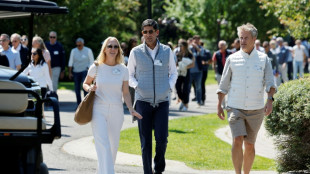 Trump nominates former US Fed official as next central bank chief
Trump nominates former US Fed official as next central bank chief
-
New Dutch government pledges ongoing Ukraine support
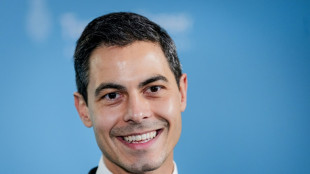
-
 Newcastle still coping with fallout from Isak exit, says Howe
Newcastle still coping with fallout from Isak exit, says Howe
-
Chad, France eye economic cooperation as they reset strained ties
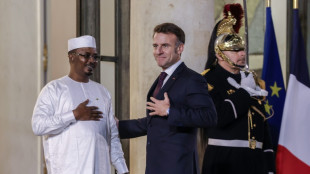
-
 Real Madrid to play Benfica, PSG face Monaco in Champions League play-offs
Real Madrid to play Benfica, PSG face Monaco in Champions League play-offs
-
Everton winger Grealish set to miss rest of season in World Cup blow

-
 Trump brands Minneapolis nurse killed by federal agents an 'agitator'
Trump brands Minneapolis nurse killed by federal agents an 'agitator'
-
Arteta focuses on the positives despite Arsenal stumble

-
 Fijian Drua sign France international back Vakatawa
Fijian Drua sign France international back Vakatawa
-
Kevin Warsh, a former Fed 'hawk' now in tune with Trump

-
 Zverev rails at Alcaraz timeout in 'one of the best battles ever'
Zverev rails at Alcaraz timeout in 'one of the best battles ever'
-
Turkey leads Iran diplomatic push as Trump softens strike threat

-
 Zelensky backs energy ceasefire, Russia bombs Ukraine despite Trump intervention
Zelensky backs energy ceasefire, Russia bombs Ukraine despite Trump intervention
-
'Superman' Li Ka-shing, Hong Kong billionaire behind Panama ports deal

-
 Skiing great Lindsey Vonn crashes at Crans-Montana, one week before Olympics
Skiing great Lindsey Vonn crashes at Crans-Montana, one week before Olympics
-
Slot warns Liverpool 'can't afford mistakes' in top-four scrap

| SCS | 0.12% | 16.14 | $ | |
| BCC | -1.3% | 79.14 | $ | |
| BP | -1.42% | 37.506 | $ | |
| BTI | 0.07% | 60.25 | $ | |
| RIO | -5.82% | 89.9 | $ | |
| GSK | 1.44% | 51.395 | $ | |
| CMSC | -0.11% | 23.67 | $ | |
| BCE | 0.19% | 25.533 | $ | |
| RBGPF | 1.65% | 83.78 | $ | |
| CMSD | -0.08% | 24.04 | $ | |
| JRI | 0.27% | 12.99 | $ | |
| AZN | 0.59% | 93.14 | $ | |
| RELX | -1.73% | 35.55 | $ | |
| VOD | -0.58% | 14.625 | $ | |
| RYCEF | -2.69% | 16 | $ | |
| NGG | -0.54% | 84.59 | $ |

'Sowing peace'? Colombia program for war criminals stokes debate
Once confined to jail over the killings of hundreds under his watch, former Colombian general Henry Torres now spends his days planting trees and otherwise free.
Like dozens of other alleged war criminals in the South American country, 61-year-old Torres is participating in an alternative sentencing program that some victims' families decry as a "mockery" of justice.
"We are not only restoring an ecosystem but trying to minimize the damage we caused... it was a way to compensate for damage without being deprived of freedom," he told AFP.
Torres commanded a brigade that was found responsible for hundreds of cold-blooded executions as the army sought to inflate results in its fight against leftist guerrillas.
Between 2002 and 2008, some 6,400 civilians were executed by the military, which presented them as enemy fighters, according to the Special Jurisdiction for Peace (JEP) court.
The JEP was set up after a 2016 peace deal between the government and the once-powerful FARC insurgent group to try the worst crimes committed during the decades-long conflict.
Under the peace deal, the court can offer alternatives to jail time or lesser sentences to people who confess their crimes and make reparations to victims.
"We are trying to reconcile our society after a very serious war. It is very new and very complex," JEP president Roberto Vidal told AFP.
Initiatives like "Sowing Peace," in which 46 soldiers are taking part, are "pilot projects through which we are learning how to set this up."
Victims' families are not happy.
"Come and plant trees... that is absolutely insufficient, a kind of mockery," said Margarita Arteaga, whose brother Kemel was killed by soldiers in 2007.
- Healing wounds -
Under the Bogota sun, a dozen men clear undergrowth with machetes.
The younger ones work the land, while Torres and other older men prepare saplings which will be used to reforest a 15-hectare area of southwestern Bogota that is home to many people displaced by the conflict.
"With this work, we are seeking to heal these wounds... to transform the damage caused," said retired major Gustavo Soto, 52.
As part of the peace process, Soto came face-to-face last year with the relatives of 85 civilians murdered by a unit under his command.
"It was quite difficult," he said of the experience.
In the early 2000s, Soto was part of a counterinsurgency launched under the right-wing government of Alvaro Uribe.
"Unfortunately, proven results were required in the form of combat casualties. It was how the upper command evaluated us," he said.
At the work site, Soto and other former soldiers clear invasive gorse bushes whose large thorns pierce through their thick overalls.
Torres and Soto were both in prison awaiting trial when the JEP granted them freedom in exchange for confessions and taking part in initiatives like "Sowing Peace."
They come voluntarily, under court supervision, with each day worked recognized as "advance" payment on the maximum eight-year penalty the JEP can impose.
The tribunal, which started operating in 2017, has yet to hand down any sentences.
Experts question whether the projects really impose the "effective restrictions on freedoms and rights" called for under the peace deal.
JEP judge Vidal said that participants may also be surveilled, including by "cell phone monitoring."
- Too good a 'deal?' -
Margarita Arteaga believes the military did "the deal of their lives" with the JEP.
Her brother Kemel was a craftsman and punk fan who was trying his hand at selling handmade earrings and necklaces when soldiers kidnapped him in a bar and executed him.
His killer told a JEP hearing that Kemel had been asked to be shot from the front. He didn't die immediately and had to be finished off on the ground, she learned.
"They planted a grenade and a revolver on him," Arteaga recalled through tears.
Soldiers presented him as an extortionist killed in an exchange of gunfire.
"I can understand the symbolic nature of the issue of the trees, but it does not repair" what was done, said Arteaga, a spokeswoman for a victims' association.
There are two other restorative justice initiatives in Colombia. In one, perpetrators are rebuilding an Indigenous civic center, and in the other, they provide education about the dangers of antipersonnel mines.
Arteaga proposes the programs go further, with soldiers like Torres made to visit battalions and "tell soldiers-in-training what they did, and what should not happen" ever again.
C.Stoecklin--VB



